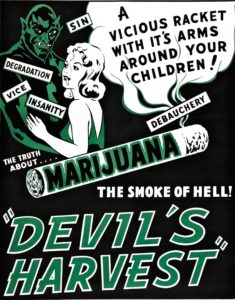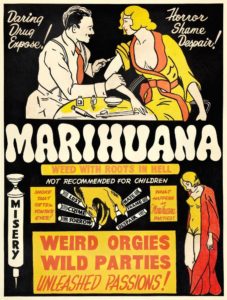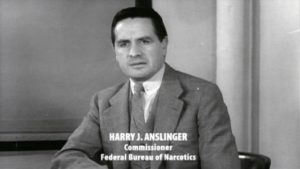cannabis, cannabis use, legalization, weed
A Brief History of American Anti-Cannabis Propaganda
Living in Vancouver, we’ve seen pot stores, dispensaries and cannabis use for a long time. It’s easy to forget that this thing we take for granted has changed the lives of so many for better or worse. The better being alleviation of critical illnesses and recreational freedom. The worse? A history of anti-cannabis propaganda that has shattered the lives of thousands.
When researching some of the lies that have been told in the history of cannabis, one thought kept popping into my head. In the South Park episode “Gluten Free Ebola,” a representative of the USDA drinks concentrated gluten and immediately dies a painful death which includes his penis flying off like a firework. That is the level of over-the-top, too-many-edibles satire that springs to mind when reading historical anti-weed propaganda. Stuff so insane you couldn’t make it up. Here’s some of the weirdest, most shocking anti-cannabis propaganda from the sadly non-fictional history of planet earth.


The All-Time Anti-Cannabis Propaganda Flick
The poster boy. If you’re a proud member of the cannabis community, you’ve probably heard of the 1936 film Reefer Madness. If you haven’t heard of it, the original title was Tell Your Children, but alternate titles include The Burning Question, Dope Addict, Doped Youth, and Love Madness. Are you getting a sense of what we’re in for here? Imagine a 100-year-old lecturing you about the dangers of the devil’s lettuce and you’re there.
The film begins with youths being tempted into trying weed and descends into a series of misadventures including a hit-and-run, attempted rape, manslaughter, suicide, and hallucinations. All that fun stuff. When watching it, it’s honestly hard to believe this was made by human beings in earnest.
Reefer Madness now looks like a hilarious satire of overzealous and out of touch anti-cannabis campaigners. However, art reflects the time it was made. While many, even then, viewed the film as a trash propaganda piece, the fear it instilled in susceptible parents at the time could still be holding us back today. You can watch the whole ridiculous show for free here if you’re intrigued.
Did James C. Munch Turn into a Bat?
This next character came to my attention as a meme on Twitter about the ridiculousness of propaganda. However, with any political post, even in meme form, it’s always best practice to look into the facts before posting. Misinformation is currently destroying the world but that’s probably a whole blog post in and of itself.
Dr James Munch was the U.S. government’s “official expert” on cannabis in the 1930s, used for spouting propaganda by Harry Anslinger – more on him later. Munch seemed legit, as a professor of physiology and pharmacology in the School of Pharmacology at Temple University in Philadelphia, PA. He studied the effects of cannabis on dogs and people. He supposedly claimed under oath that: “After two puffs on a marijuana cigarette, I was turned into a bat.”
This is a hilarious claim, and several reputable publications claim it as fact with books on the history of cannabis cited as sources*. What is clear is that Munch repeatedly testified in court as an expert on behalf of the Federal Narcotics Bureau.
In a 1938 murder case, Munch was again called to testify about the impacts of marijuana use as the defendant, Ethel Sohl, had to rely on a defence that she was stricken with “marijuana madness.”
Munch said he had been retained by the US government as an expert consultant because of his studies into the effects of marijuana. He claimed he had smoked himself as part of his research. Here’s the exact quote of what he said during his testimony on Friday, Feb. 11, 1938, according to the New York Times:
“I smoked the cigarette while sitting in a chair. I had a dream. I dreamed that I had lived in an ink bottle for 200 years. Then I climbed to the neck of the bottle and I wrote a book. Then I flew out of the bottle and I flew around the world twice. Then I awakened. I had been asleep in the chair for 16 minutes.”
The Newark Ledger expanded on the testimony, according to “Reefer Madness: A History of Marijuana.”
“Space vanishes. You can walk across the ocean. You can jump from here to the Panama Canal. Things you do seem to be the things you should do. The weakling feels he can fight a prizefighter.”
While some judges took Munch’s overzealous descriptions and laughable comparisons between the effects on people equating those on dogs, it’s hard to tell what effect this had on public perception. The Federal Narcotics Bureau were content to have Munch spreading misinformation and fear under oath until people started using the influence of cannabis as a way to get away with crimes. The ruthless head of the FNB then stopped using Munch, who was only one of his propogandists.
Harry Anslinger and the War on Drugs
Harry Anslinger was a rising star within the US government during the prohibition era. He had a long career in various military and law enforcement agencies, tackling issues of drug trafficking and the illegal trade of alcohol. He was viewed as incorruptible, by-the-book, and honest. In 1930, at age 38, Anslinger was appointed the first and founding commissioner of the Federal Bureau of Narcotics. When prohibition ended in 1933, Anslinger set his sights on cannabis as his new target.

Anslinger repeatedly supported Dr James Munch as an expert witness on cannabis at trials, using Dr Munch’s over-the-top testimonies on the effects of smoking to stoke the public’s growing fears of the plant. He used all manner of propaganda tools in his war on drugs while also stirring racial tensions – which are sadly inextricably linked with the criminalization of marijuana.
Without any scientific backing, Anslinger pushed the idea of cannabis as a violence-inducing drug and made forced associations between the plant and minority communities. He fostered a link between cannabis and newly arrived Mexican immigrants – who did help popularize it in the States – by not using the scientific name cannabis but pushing the Spanish word, marihuana. His race-baiting didn’t stop there. He also spun a narrative that using marijuana made black people forget their “place in society.”
Related: Seth Rogen On Weed Advocacy, Racism, and the Dangers of Alcohol
Here are some delightful anti-cannabis propaganda quotes by Anslinger:
“There are 100,000 total marijuana smokers in the US, and most are Negroes, Hispanics, Filipinos and entertainers. Their Satanic music, jazz and swing, result from marijuana usage. This marijuana causes white women to seek sexual relations with Negroes, entertainers and any others.”
“Marihuana influences Negroes to look at white people in the eye, step on white men’s shadows and look at a white woman twice.”
“The primary reason to outlaw marijuana is its effect on the degenerate races.”
These probably give you a sense of the kind of hard-line character cannabis activists had to contend with back then.
Related: How a racist hate-monger masterminded America’s War on Drugs
Anslinger not only started the war on drugs, he also propagated many of the racist ideals that hold America back to this day. He also planted the seed in the minds of countless people that cannabis is dangerous. He was fully supported and seemingly had free rein to manage the FNB as he saw fit. The result of which has led to thousands of people, predominantly black people, being locked up or killed for possessing a plant.
Let us know if you like this kind of content as it’s a little different from our usual posts. If you’re looking for an online dispensary in Canada, look no further. We’ve got whatever you need. Take a look through our online pot store and hit us up if you have questions or feedback. Smoke responsibly.
Further reading:
*Cited sources.
– History of the Marijuana Laws, speech to the 1995 California Judges Conference, by Professor Charles Whitebread, USC Law School.
– Forbidden Fruit and the Tree of Knowledge: The Legal History of American Marijuana Prohibition, Professors Richard Bonnie, and Charles Whitebread.
